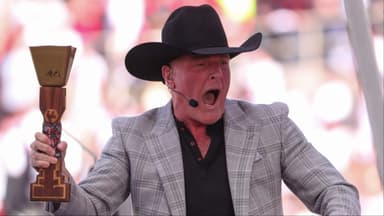The National Football League is doing just fine. While other leagues like the NBA and MLB struggle with viewership issues, the NFL continues to report record revenues year after year.
Advertisement
Last year, the league posted $23 billion in earnings, staying on track to attain commissioner Roger Goodell’s goal of $25 billion by 2027. That goal, set in 2010, just a few years into Goodell’s tenure, was ambitious at the time. After all, the revenue for that year was reportedly just $8 billion.
In 2024, each NFL team received $432.6 million in national revenue, a 7.5 percent increase from the previous year. Total league-wide revenue has risen by 74 percent since 2021. Through the first three weeks of the 2025 season, every broadcast partner from Fox to Amazon Prime is reporting massive increases in viewership over the same weekends last year.
The NFL shield and its machine seem like an unstoppable juggernaut… But one that raises some serious questions. MIT economist Jonathan Gruber recently explained how the NFL’s increases in revenue and viewership aren’t necessarily because of good business.
Gruber explained that the NFL is operating as a “legal cartel” because of the fact that it sells broadcasting rights as a single entity. This limits competition so that they can drive up prices for viewers and fans. Gruber pointed out how the NFL — and sports in general — have monopolized TV ads over the past decade.
“Advertising is incredibly valuable during football games. Increasingly so, because now it’s the one place in the world we don’t stream. So we stream everything we watch now, so we don’t have ads,” Gruber said via MIT OpenCourseWare.
“You can’t stream sports, so sports advertising has gone through the roof, because advertising in other contexts is less valuable. It used to be you could advertise everywhere, but now you can’t. It’s really just sports is the last place people watch ads,” he added.
The NFL is essentially a controlled marketplace with 32 teams (or 32 businesses) competing with each other. Gruber has found that the system in place incentivizes these 32 competitors to collude.
Basically, unlike pretty much every other major sports league in North America, the NFL sells its TV rights as a league. If it instead had teams sell their rights individually, it would create competition and lower prices for consumers.
“Individual teams do not sell their TV rights, which would lead to competition. The league just sells the TV rights. Which causes a cartel. They’re saying, ‘If you wanna broadcast football, you have to come to us, and we’re gonna charge a super-high price.’ And as a result, quite frankly, watching football is kind of a pain in the a**, at this point,” explained Gruber.
Quick disclaimer: These rules generally only apply to the U.S., not to Canadian NFL viewers.
Gruber then explained how the NFL is essentially squeezing and gouging its fan base for every last TV dollar, while also doing the same at the stadium gates for those who want to watch live.
If you like a team that is not your local team, you need to “pony up” $350 for NFL Sunday Ticket, which shows all of the Sunday afternoon games, no matter the geography. However, this does not include those overseas Sunday morning games, which require an additional ESPN+ subscription. As Gruber says, “it’s incredibly expensive to watch football” nowadays.
“If you wanna see all the football games, it costs you a pretty penny? Why? Because the league has colluded and set up a structure where firms can’t undercut each other. Otherwise, firms would say, ‘Look, a lot of people want to watch my team, I’m gonna go strike a separate deal,'” he added.
Even in 1957, back when the Lions and the Browns were the toast of professional football, the Supreme Court of the U.S.A. ruled that the sort of business dealings being perpetrated here by the NFL were illegal and anticompetitive. But the NFL is still allowed to do it now on a much larger scale. Why?
“Because Congress stepped in. And said, ‘Well, we’re gonna grant them an antitrust exemption. We’re gonna say football is such a nationally important priority, that we’re gonna actually exempt football from our nation’s anti-trust laws… I’d proved to you that Congress cares more about football than economics. They cared more about the football league than actually making football affordable for us to watch,” explained Gruber.
The U.S. government decided that football was so special that the laws essentially did not apply to them in this case. And over time, that has allowed the greedy billionaires at the top of the NFL pyramid to slowly but surely turn their little kingdom into a cabal.
The MIT economist and professor described this frankly as a “cartel” that operates with similar business tactics as those Mexican drug cartels we should all be so scared of.





